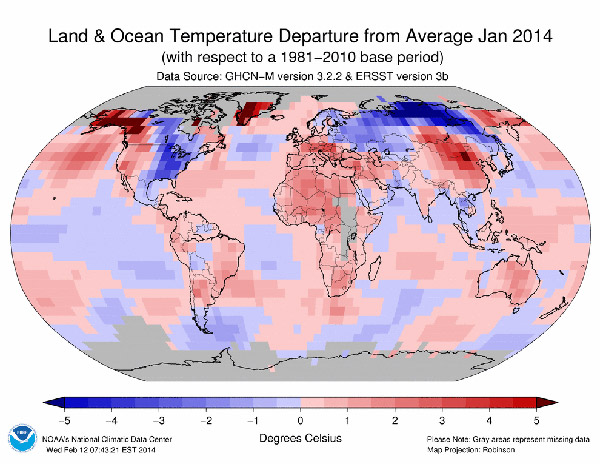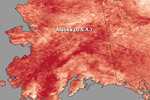Worldwide, this January was the fourth warmest since record-keeping began, according to new data released by National Oceanic and Atmospheric Administration (NOAA). While parts of the world, most notably eastern North America and northern Russia, experienced temperatures well-below average, overall the month was a scorcher. In fact, another dataset, from NASA’s Goddard Institute for Space Studies (GISS), that uses different methodology, found that January was the third warmest since record keeping began.
According to NOAA, global temperatures were 0.65 degrees Celsius (1.17 degrees Fahrenheit) above the 20th Century average. Some parts of the world experienced remarkably warm weather including Alaska, western Canada, Greenland, Mongolia, southern Russia, and northern China. Most of Africa, Europe, and Australia also experienced above average temperatures for the month.
Global warming due to burning fossil fuels has caused temperatures to rise around 0.85 degrees Celsius since record-keeping in the 1880s. In fact, the Earth hasn’t experience a below average year since 1976 and, even more amazingly, this January was the 347th month in a row that was above the 20th Century average. And things may be even hotter than NASA and NOAA currently report. Recent research argues that temperature data gaps in the Arctic sea has led to scientists underestimating the rate of warming occurring worldwide.

Temperature anomalies for January 2014 as compared to averages from 1981-2010. Map courtesy of NOAA. Click to enlarge.
January was also renowned for unusual jet stream patterns that led to the so-called “polar vortex” which brought Arctic temperatures down to parts of the U.S. and led to the UK undergoing its wettest winter month on record. Some scientists have argued that observed changes in the jet stream may be linked to melting ice cover in the Arctic, although there is no consensus on this yet. Where scientists agree is that the Earth is warming and greenhouse gas emissions are the culprit.
Epic flooding in the UK has pushed a new round of dialogue over what the government is doing–or not doing–about the issue of climate change, and indeed whether or not the flooding was exacerbated by climate change (warmer oceans means more precipitation). Criticism of the government, pushed Prime Minister, David Cameron, to say this week, “I believe man-made climate change is one of the most serious threats that this country and this world faces.”
Cameron’s administration includes a number of prominent climate deniers, including environment secretary, Owen Paterson.
Still, Cameron was echoing recent statements made by U.S. Secretary of State John Kerry. While traveling in Indonesia, Kerry called climate change “perhaps the world’s most fearsome weapon of mass destruction.”
Still, scientists say the world’s governments are not doing nearly enough to cut greenhouse gas emissions and avoid catastrophic climate change. Carbon dioxide emissions were expected to hit a new record high last year of 36 billion tonnes, according to the Carbon Budget.
Related articles

(02/24/2014) An assessment of ocean acidification, presented at the UN Climate Change Conference in Warsaw in November 2013, starkly concluded that acidity is on track to rise 170 percent by the end of this century. As many key species are sensitive to changes in acidity, this would drastically impact ocean ecosystems, with effects especially pronounced in polar regions where the cold waters intensify acidification, and which are home to many organisms that are particularly vulnerable to acidification.
Alaska roasting: new NASA map shows the Final Frontier in grip of January heatwave

(02/05/2014) Alaska got California weather at the end of January, as displayed by a new map based on data by NASA’s Terra satellite’s Moderate Resolution Imaging Spectroradiometer (MODIS). The U.S. state experiences one of its warmest winter periods on record during the second half of January, including some temperatures that ran 40 degrees Fahrenheit (22 degrees Celsius) above average. According to the EPA, temperatures in Alaska have risen an average of 3.4 degrees Fahrenheit (1.9 degrees Celsius) in just the last 50 years due to climate change.
2013 was the seventh hottest year yet

(01/27/2014) Global warming continues apace as 2013 was the seventh warmest year in the past 133 years, according to a new analysis from NASA’s Goddard Institute for Space Studies (GISS). In total, the global temperature in 2013 averaged 14.6 degrees Celsius (58.3 degrees Fahrenheit), or 0.6 degrees Celsius (1.1 degrees Fahrenheit) hotter than the 20th Century average.
Underestimating global warming: gaps in Arctic temperature data lead scientists and public astray

(01/15/2014) No place on Earth is heating up faster than the Arctic, but just how fast has remained an open question due to large gaps in temperature data across the vast region. Now, a recent study in the Quarterly Journal of the Royal Meteorological Society finds that not only is the Arctic warming eight times faster than the rest of the planet, but failure to account for temperature gaps has led global datasets to underestimate the rise of temperatures worldwide.
Carbon emissions rise 2 percent in U.S. due to increase in coal
(01/14/2014) Carbon dioxide emissions rose two percent in the U.S. last year, according to preliminary data from the Energy Information Administration. Emissions rose largely due to increased coal consumption, the first such rise in U.S. emissions since 2010. Still, the annual emissions remain well below the peak hit in 2007 when emissions hit 6 billion tons.
Climate fail: Geoengineering would cool planet, but screw up rainfall patterns

(01/14/2014) For decades, scientists have been grappling with the consequences of climate change and working toward viable solutions. Climate engineering, also known as geoengineering, is the most controversial possible solution. Currently, one of the most talked about geoengineering ideas is Solar Radiation Management (SRM), which intends to block shortwave solar radiation, thus cooling the Earth to offset rising temperatures. In other words, SRM may be one way in which global temperatures could be artificially stabilized.
Down Under scorching: Australia experiences warmest year on record
(01/06/2014) Australia had its warmest year on record, with annual temperatures 1.2 degrees Celsius (2.16 degrees Fahrenheit) above the 1961-1990 average, according to a new analysis from Australia’s Bureau of Meteorology (BOM). This is 0.5 degrees Celsius higher than the previous warmest year on record—2005—for Australia. Global warming due to burning fossil fuels is increasing temperatures worldwide.
Global warming could upset Antarctic food chain

(01/02/2014) Resting near the bottom of the foodchain, Antarctic krill (Euphausia superba) underpin much of the Southern Ocean’s ecosystem. But in a rapidly warming world, these hugely-abundant crustaceans could see their habitat shrink considerably. In a recent paper in PLOS ONE, scientists predict that Antarctic krill could lose 20 percent of their growth habitat, or 1.2 million square kilometers.
Climate change drives Florida mangroves northward
(12/30/2013) A decline in the frequency of extreme cold weather in Florida has allowed coastal mangrove forests to expand northward, finds a study published this week in Proceedings of the National Academy of Sciences.
World first: Russia begins pumping oil from Arctic seabed
(12/23/2013) Oil has begun to be pumped from the Arctic seabed, according to Russian oil giant, Gazprom. The company announced on Friday that it has begun exploiting oil reserves at the offshore field of Prirazlomnoye. The project, which is several years behind schedule, is hugely controversial and made international headlines in September after Russian military arrested 28 Greenpeace activists protesting the operation along with a British journalist and Russian videographer.